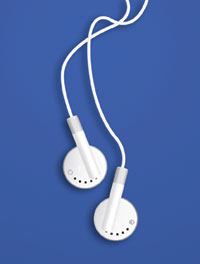As a teenager, I rode a bike without a helmet and my car didn’t have airbags.  I ate irradiated meat and inhaled enough secondhand smoke to fill the Hindenburg. By today’s standards, it’s a wonder I lived to see the sunset each day. No wonder my parents couldn’t have cared less when I brought home Kiss’ “Love Gun” and dropped the needle on “Plaster Caster.”
I ate irradiated meat and inhaled enough secondhand smoke to fill the Hindenburg. By today’s standards, it’s a wonder I lived to see the sunset each day. No wonder my parents couldn’t have cared less when I brought home Kiss’ “Love Gun” and dropped the needle on “Plaster Caster.”
Nowadays, of course, my family wears bike helmets in our SUV, in case one of the eight airbags fails. We buy our food at the farmers’ market and we just signed a petition to ban smoking outdoors. As parents, we fret constantly about our children’s well-being. And in the modern age, we worry about the influence of popular culture, particularly the music pumping into our teenagers’ brains through that pair of white earbuds. A 2008 survey of teen students by Piper Jaffray found that 87 percent of them own an iPod, an increase of 7 percent from 2007. Other media players hardly register: Apple has an 84 percent share of the market. So if parents want to know what music their teenagers listen to, they need to know iTunes.
Get iTuned in
Apple has anticipated your concern: The iTunes store has more safety features than a Volvo. Select the Edit menu, then Preferences. Front and center is the Parental Control tab. You can disable podcasts, radio, even the entire iTunes store if you like. You can restrict movies to G, PG, PG-13 or R, and restrict TV shows to no fewer than six rating categories. Then you can restrict games to age groups (4+, 9+, 12+ and 17+) and block music labeled “explicit” by the company that supplied it to Apple. After you have checked your boxes, the kids can still see the material but are forbidden from reading about it or buying.
Once you’ve set your thresholds, you can lock the form and require a password to adjust the settings.
Dawn, a Kirkland mother of three, knows iTunes’ controls well. “Everything’s checked on mine,” she says. “I’m pretty stringent about what I want them to see.” Her oldest son, Nathan, is 13. Dawn checks different boxes for him compared to his younger brothers, but nonetheless keeps Lil Wayne, a popular, profane rapper, out of reach. And although Nathan’s Nano has a video screen, he uses it mainly for music. “We haven’t used TV and movies that much,” Dawn says. “I used to travel a lot with the kids by airplane or car. If they got bored with the Nintendo, they could just sit back and listen to music. Sometimes they’d fall asleep.”
So far, Dawn is pleased with Apple’s controls, particularly the one that prevents them from buying music or movies themselves. “When they first got their iPods, I checked their libraries to make sure I approved of the music they had. But now I trust iTunes’ controls.”
Scary sharing?
What about Nathan’s friends giving him unsavory music? “Sure, I worry about his friends’ parents having looser controls. I talk to him about that,” Dawn says. It doesn’t hurt that iTunes does not allow cherry-picking from others’ music libraries: If Nathan plugged his Nano into his friend’s iTunes, he would lose all his own music.
While Dawn says she’ll ban “explicit” music until her kids are in college, Melissa, a 16-year-old Tacoma resident, enjoys unfettered access to the iTunes marketplace. It has always been so, ever since she got her first iPod at 13. “In the early days, my parents didn’t know how to work iTunes, so I downloaded what I wanted,” she says. Her parents’ laissez-faire approach continues, even as they’ve become hip to iTunes’ protective features. Melissa’s Touch now contains rap, hip-hop, rock, pop, even some classical. “My parents are teachers,” she says. “My dad has chaperoned middle school dances. He knows what music we listen to.”
And he doesn’t care? “They have wondered how much rap was on there — I have a lot of rap,” she says. “But they haven’t really been too concerned … I think they trust me. They listened to some of the music on my iPod, but they know I’m not the type of person to do the things that the songs talk about.”
Whether you regulate your teenager’s music or not, bear in mind that even Chopin hurts if it’s played loudly. Instead of clamping down, however, parents might consider lying low when it comes to high volume. A new study by the University of Colorado at Boulder and Children’s Hospital Boston indicates teenagers who are pressured to lower the volume of their iPods instead turn them up. And boys are more likely than girls to crank it up to 11.
Still, the same study found that somewhere between 7 percent and 24 percent of iPod users play their music at “risky” levels. So far, we’re not raising a nation of Pete Townshends.
Even Melissa, a hardened addict of unfiltered digital music, keeps the volume chill. To her, it’s all about the content. “There’s a friend of mine — her parents won’t let her listen to Lil Wayne. But I do.”
Derek Blaylock lives in Seattle with his wife and two sons.









